9 Best Herbal Tinctures For Depression
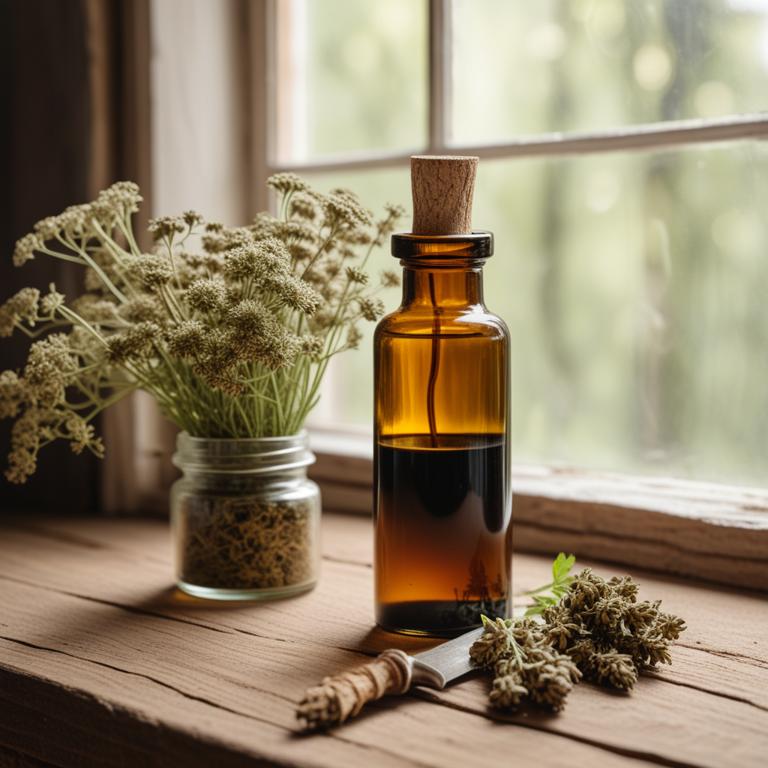
Herbal tinctures for Depression are concentrated plant extracts used to treat symptoms of depression, anxiety, and mood disorders.
These natural remedies offer a range of benefits, including reduced stress, improved sleep, and increased energy levels.
Popular herbal tinctures used to treat depression include St. John's Wort, which has been shown to have a positive effect on mood by regulating neurotransmitters; Ashwagandha, which helps reduce stress and anxiety by balancing the body's response to stress; and Passionflower, which has a calming effect on the nervous system and can help alleviate symptoms of anxiety.
Additionally, other herbal tinctures such as Ginkgo Biloba, which improves mood and cognitive function; Lavender, which promotes relaxation and reduces anxiety; and Omega-3 rich Bladderwrack, which supports the brain's ability to regulate mood, are also used to treat depression.
According to "Praxis", tinctures for depression, specifically those made from St.-John's wort, are a useful option for treating mild to moderate depression due to their low rate of adverse effects.
Below there's a list of the 9 best herbal tinctures for depression.
- 1. Passiflora incarnata tinctures
- 2. Valeriana officinalis tinctures
- 3. Avena sativa tinctures
- 4. Hypericum perforatum tinctures
- 5. Withania somnifera tinctures
- 6. Ginkgo biloba tinctures
- 7. Zingiber officinale tinctures
- 8. Lavandula angustifolia tinctures
- 9. Curcuma longa tinctures
Also you may be interested in...
TODAY'S FREE BOUNDLE
Herb Drying Checklist + Herbal Tea Shopping List + Medicinal Herbs Flashcards
Enter you best email address below to receive this bundle (3 product valued $19.95) for FREE + exclusive access to The Aphotecary Letter.
$19.95 -> $0.00
1. Passiflora incarnata tinctures
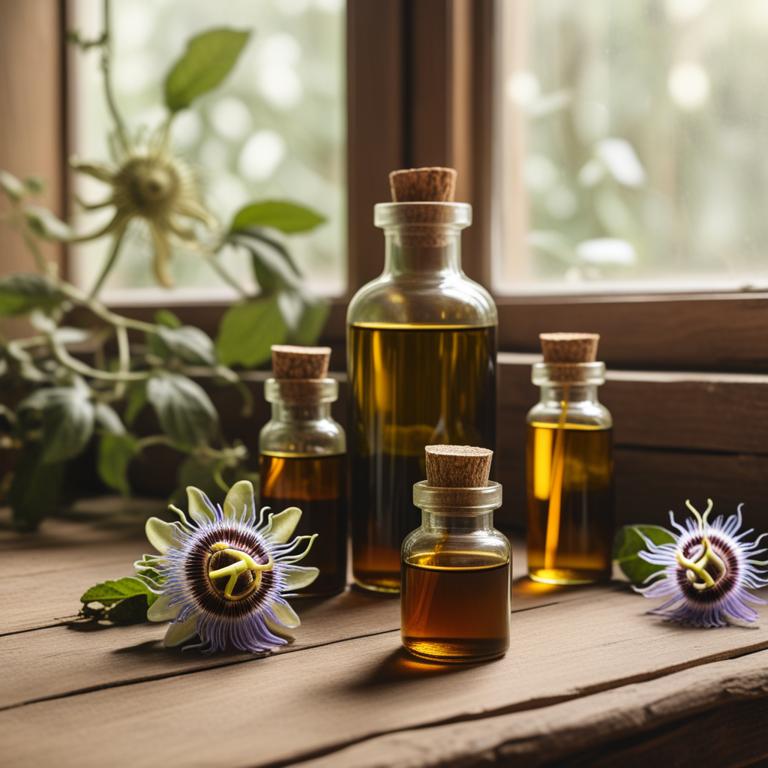
Passiflora incarnata tinctures have been traditionally used to treat depression due to their anxiolytic and sedative properties, which help to calm the nervous system and reduce symptoms of anxiety and stress.
The bioactive constituents of Passiflora incarnata, including flavonoids, alkaloids, and glycosides, have been shown to have a positive effect on neurotransmitter activity, particularly by increasing the levels of serotonin, dopamine, and GABA, which are essential for mood regulation.
By regulating these neurotransmitters, Passiflora incarnata tinctures can help to alleviate symptoms of depression, such as feelings of sadness, hopelessness, and loss of interest in activities.
The benefits of using Passiflora incarnata tinctures to treat depression include their natural and non-addictive nature, making them a safe and effective alternative to conventional medications.
Related Study
According to the study, Passiflora incarnata tinctures may be effective in managing depression, as the majority of its phytoconstituents were predicted to have antidepressant activities and were pharmacologically validated to have an ameliorative role in associated depression.
2. Valeriana officinalis tinctures
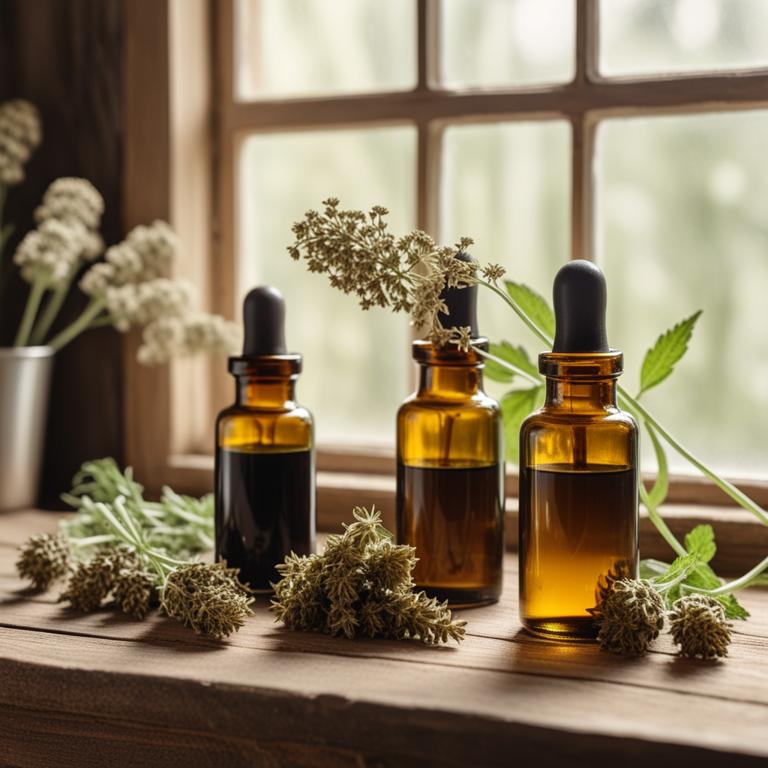
Valeriana officinalis tinctures have been traditionally used to treat depression by promoting relaxation and reducing anxiety due to their calming and sedative properties.
The bioactive constituents, including valepotriates, valerenic acid, and isovaltrate, help to modulate the activity of neurotransmitters such as serotonin and GABA, thereby alleviating symptoms of depression.
By reducing stress and anxiety, Valeriana officinalis tinctures help to improve mood and overall mental well-being, making it a potential adjunctive therapy for individuals suffering from depression.
The benefits of using Valeriana officinalis tinctures for depression include improved sleep quality, reduced symptoms of anxiety and depression, and enhanced overall quality of life.
Related Study
According to "Chemical & pharmaceutical bulletin", Valeriana officinalis tinctures for depression may have potential as an antidepressant, as they significantly inhibited immobility induced by a forced swimming test in rats, similar to imipramine.
3. Avena sativa tinctures
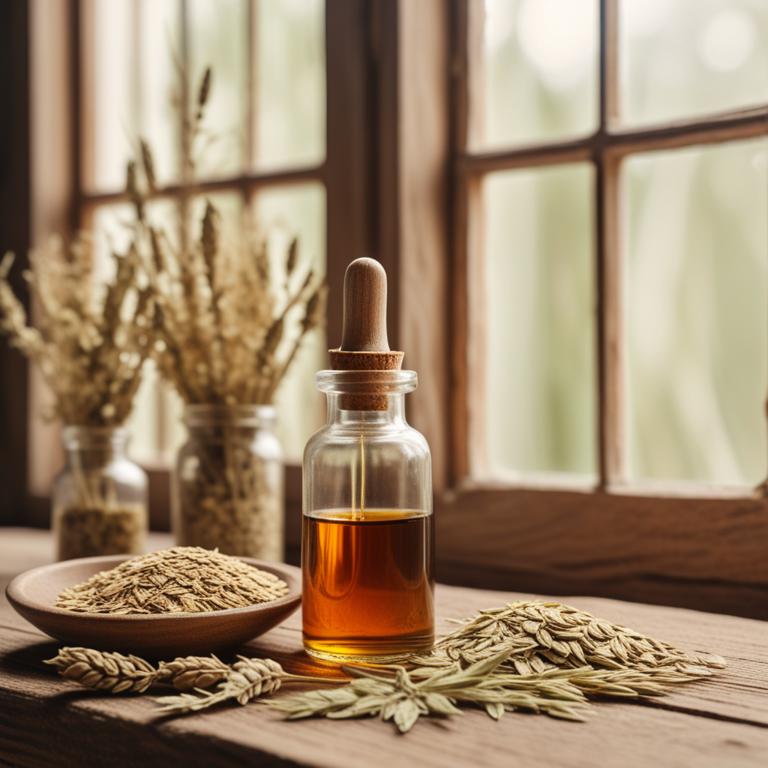
Avena sativa tinctures have been used traditionally to treat depression, and their anxiolytic and sedative properties contribute to their effectiveness.
The tinctures help to treat depression by promoting relaxation, reducing anxiety, and improving sleep quality, thereby alleviating symptoms of the ailment.
The bioactive constituents of Avena sativa, including avenalol, avenacoside, and avenanthramides, are responsible for its antidepressant properties, which help to regulate mood and reduce stress levels.
By using Avena sativa tinctures, individuals can benefit from improved mood, reduced anxiety, and enhanced overall well-being, making it a potential natural alternative for managing depression.
Related Study
According to "BioMed research international", Avena sativa tinctures for depression may be an alternative option for treatment in cases where conventional drugs are not applicable due to their side effects, low effectiveness, or inaccessibility.
4. Hypericum perforatum tinctures
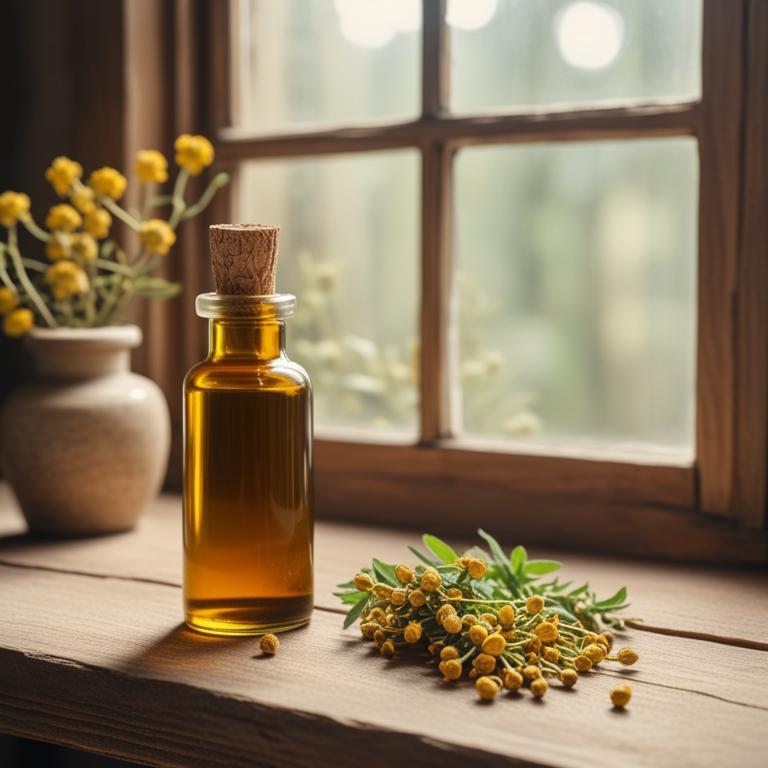
Hypericum perforatum tinctures, also known as St. John's Wort, have been used traditionally to treat mild to moderate depression due to their antidepressant properties.
The tinctures' ability to inhibit the reuptake of serotonin and other neurotransmitters helps to increase the levels of these chemicals in the brain, thereby alleviating symptoms of depression.
The bioactive constituents of Hypericum perforatum, including hypericin and hyperforin, are responsible for its antidepressant effects, as they interact with the neurotransmitter system and enhance the activity of serotonin receptors.
The benefits of using Hypericum perforatum tinctures to treat depression include reduced symptoms of anxiety and improved mood, as well as a decrease in the need for conventional antidepressant medications in some cases.
Related Study
According to "European neuropsychopharmacology : the journal of the European College of Neuropsychopharmacology", Hypericum perforatum tinctures for depression show superiority over placebo in treating mild or moderate depression.
5. Withania somnifera tinctures
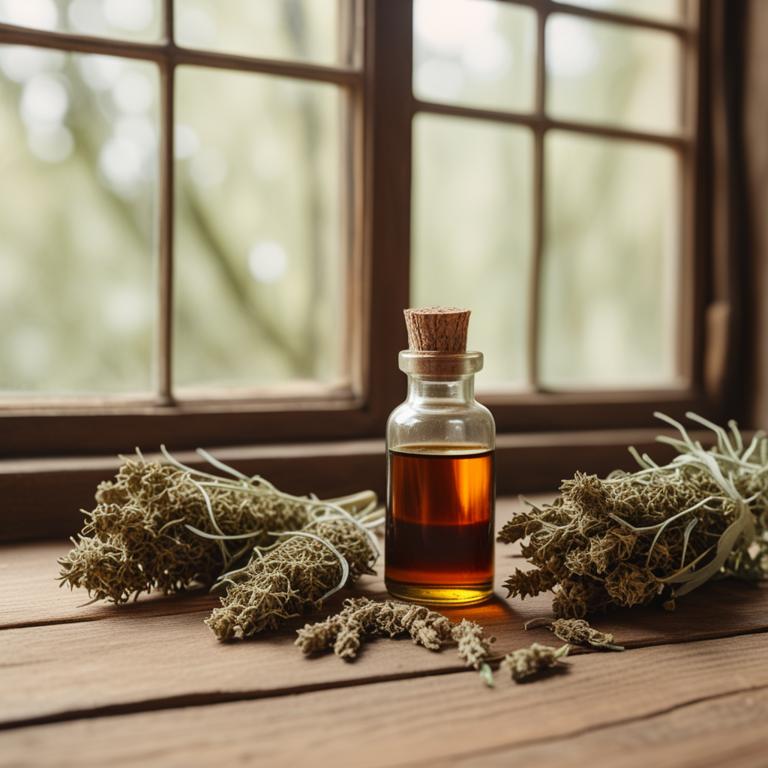
Withania somnifera tinctures have been traditionally used to treat depression by leveraging their adaptogenic properties, which help to mitigate stress and anxiety levels in the body.
This herbal preparation is believed to have a positive effect on mood regulation and cognitive function, ultimately providing relief from symptoms of depression.
The bioactive constituents of Withania somnifera, including withanolides and alkaloids, are thought to contribute to its antidepressant properties by modulating neurotransmitter activity and promoting neuroprotection.
Regular use of Withania somnifera tinctures has been reported to offer benefits such as improved mood, reduced stress levels, and enhanced overall well-being in individuals struggling with depression.
Related Study
According to "Mini reviews in medicinal chemistry", Withania somnifera tinctures for depression have been found to display antidepressant effects through the synaptic regulation of levels of neurotransmitters such as dopamine, serotonin, and noradrenaline in different parts of the brain.
6. Ginkgo biloba tinctures

Ginkgo biloba tinctures have been traditionally used to treat depression, a mental health disorder characterized by persistent feelings of sadness and hopelessness.
The properties of this herbal preparation, including its flavonoids and terpenoids, help to alleviate symptoms of depression by acting as a natural antioxidant, improving mood, and reducing inflammation.
The bioactive constituents of Ginkgo biloba, such as bilobalide and ginkgolides, are responsible for its antidepressant effects, which include enhancing neurotransmitter activity and promoting neural health.
The benefits of Ginkgo biloba tinctures in treating depression include improved mood, reduced anxiety, and enhanced cognitive function, making it a promising natural remedy for individuals suffering from this condition.
Related Study
According to "International journal of molecular sciences", Ginkgo biloba tinctures for depression may exhibit antidepressant activity through mechanisms such as inhibiting monoamine reuptake and monoamine oxidase activity, as well as exerting anti-inflammatory effects, which are thought to be significant pathogenetic factors in depression.
7. Zingiber officinale tinctures

Zingiber officinale tinctures have been traditionally used to treat depression due to their antidepressant and anti-anxiety properties, which help to alleviate symptoms of the ailment.
The bioactive constituents, including gingerols and shogaols, have been found to interact with neurotransmitters, such as serotonin and dopamine, to regulate mood and reduce stress.
By modulating the levels of these neurotransmitters, Zingiber officinale tinctures can help to improve mood, reduce symptoms of depression, and enhance overall well-being.
Regular use of Zingiber officinale tinctures has been reported to provide benefits, including reduced symptoms of anxiety and depression, improved sleep quality, and enhanced cognitive function.
8. Lavandula angustifolia tinctures
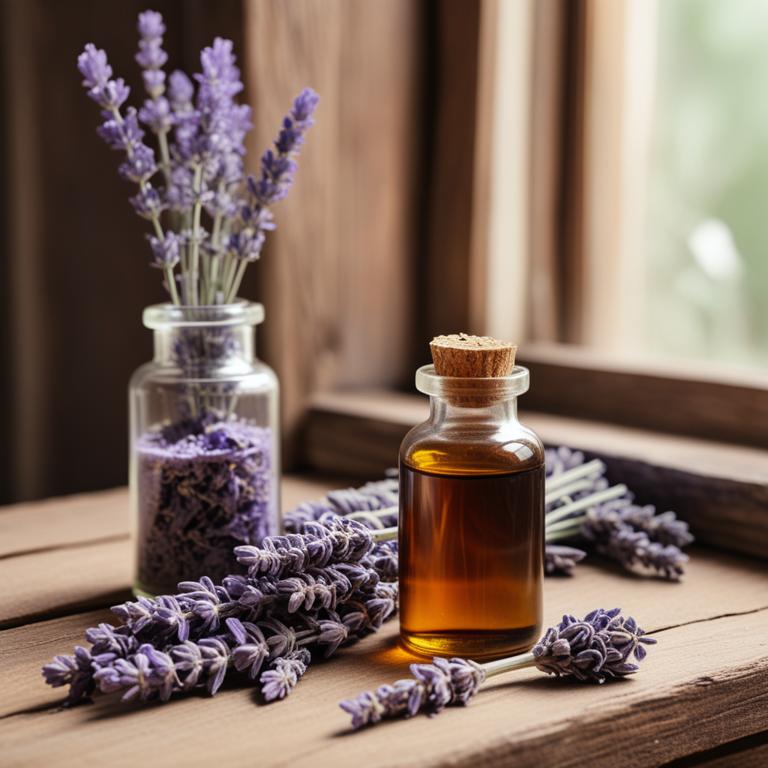
Lavandula angustifolia tinctures, derived from the flowers of the lavender plant, have been traditionally used to treat depression due to their calming and anxiolytic properties.
The bioactive constituents, including linalool, linalyl acetate, and camphor, in these tinctures help to regulate the mood by promoting relaxation and reducing anxiety.
By acting on the GABA receptors in the brain, these constituents help to alleviate symptoms of depression, such as feelings of sadness and hopelessness.
The benefits of using Lavandula angustifolia tinctures to treat depression include reduced symptoms of anxiety and depression, improved sleep quality, and enhanced mood stability.
Related Study
According to "Molecules (Basel, Switzerland)", Lavandula angustifolia tinctures for depression exhibit antidepressant properties, which can help alleviate symptoms of mental stress.
9. Curcuma longa tinctures

Curcuma longa tinctures have been traditionally used to treat depression due to their adaptogenic properties, which help to balance the body's response to stress.
The bioactive constituents, including curcuminoids and polyphenols, in this herbal preparation have been shown to have anti-inflammatory and antioxidant effects, which contribute to its therapeutic benefits.
Curcuma longa tinctures are believed to help alleviate symptoms of depression by modulating the hypothalamic-pituitary-adrenal axis and increasing the production of neurotransmitters such as serotonin and dopamine.
The benefits of using Curcuma longa tinctures to treat depression include reduced symptoms of anxiety and improved mood, making it a potential natural adjunct to conventional treatment options.
Related Study
According to "CNS & neurological disorders drug targets", Curcuma longa tinctures for depression were found to be effective, along with other medicinal plants, in the treatment of depression.